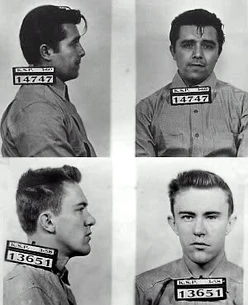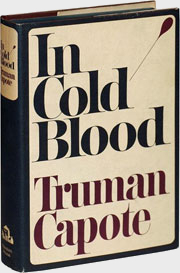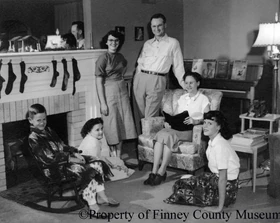"I didn't want to harm the man. I thought he was a very nice gentleman. Soft-spoken. I thought so right up to the moment I cut his throat."
- Perry Smith, about Herb Clutter
Richard "Dick" Eugene Hickock and Perry Edward Smith were two mass murderers responsible for the massacre of an entire farmer family after their attempted robbery went astray in 1959.
Background
Richard Hickock
Hickock was born in Kansas City, Kansas. Originally a popular student and athlete in high school, he changed when he was in a serious car accident in 1950 that left him seriously disfigured. Though he wanted to attend academia, his parents, both being farm workers, couldn't provide their son with a higher education. He got his first job at the age of 16, at the Santa Fe Railroad Company. When he was 19, he married one Carol Bryan, who was 16 at the time. They later conceived three sons together. He took a job as a mechanic at the Mark Buick Company. When the couple overbought, they suffered financial problems, which became worse after Hickock was in a car accident that slightly disfigured his face and left him out of work during his recovery period. After he impregnated one Margaret Edna outside his marriage, he and Bryan divorced. He then married his former mistress, but that ended in divorce as well. In order to make ends meet, he became a petty criminal, committing acts of check fraud, which is what got him arrested in January of 1956. He was sentenced to a maximum of five years at the Kansas State Penitentiary, where he met Perry Smith.
Perry Smith
Smith was born in Huntington, Elko County, Nevada and had three siblings; one brother and two sisters (one of which was born after him). His parents, "Tex" John Smith, an Irishman, and Flo Buckskin, a Cherokee, were both rodeo performers. In 1929, the family moved to Juneau, Alaska, where Tex Smith made a living of distilling bootleg whiskey. Due to him being abusive to both his wife and their children, she took them and moved to San Fransisco, California. When she died an alcoholic, choking on her own vomit, Smith was 13. He and his siblings were then placed in a Catholic orphanage. He later claimed that he was abused there as well, both physically and emotionally, for his chronic bedwetting. He was also in a Salvation Army-run orphanage, where, he also claimed later, one attendant tried to drown him. His brother committed suicide at an early age, as did one of his sisters. His other sister married, had a family and completely broke off all contact with him. At the age of 16, he joined the Merchant Marine. He later joined the U.S. Army, and served in the Korean War, earning a Bronze Star, but never being promoted. Even though he racked up a record for getting into fights with other soldiers and Korean civilians, he was honorably discharged in 1952. After getting a job as a car painter whilst living with an Army friend in Tacoma, Washington, Smith used his first paycheck to buy a motorcycle, which he crashed the same year due to bad weather. Barely surviving, Smith spent six months in a hospital recovering and when he was released from its care, he suffered chronic leg pains and became addicted to aspirin. In March of 1956, Smith was sentenced to 5-12 years in prison after being found guilty of breaking and entering, and was sent to serve the sentence at the Kansas State Penitentiary.
Killings, Capture, and Executions

Smith's (above) and Hickock's (below) mugshots taken by the FBI.
In prison, Hickock and Smith learned from Floyd Wells, a former farm worker at the Clutter farm serving time for breaking and entering, that Herb Clutter was rich and spent almost $10,000 a year on the farm. They misconstrued his story, believing Clutter kept a vast amount of cash in his house. In actuality, he was a very frequent check writer (he once even wrote a $1 check to pay for a hair cut) and kept almost no money in the house. Together, they made a plan to rob Mr. Clutter and flee with the money. After Smith was paroled on July 6, 1959, a few years early of his sentence, he awaited Hickock's release. When the latter was paroled as well on August 13, the two drove to Holcomb, Kansas, where the Clutter farm was located. After attempting to rob the house, only to discover that they had been mistaken, they killed the entire family and fled the scene. Smith later claimed that the home invasion derailed even further when Hickock considered raping Nancy Clutter. They spent the following month on the run, supporting themselves with forged checks. The bodies were discovered the next day when the family was missed at church (it was a Sunday) and friends came over to check on them.

In Cold Blood.
The murders were investigated by the Kansas Bureau of Inspection, whose investigation initially led nowhere, until Wells told a warden at the Kansas State Penitentiary about Hickock and Smith and how they had planned to rob the Clutters. Agent Harold Nye of the KBI visited Hickock's parents in Olathe, Kansas, in whose home Hickock had briefly lived after the killings and left the shotgun used in the massacre in his room (the parents had been told that he used it for rabbit hunting). On December 30, the two killers were arrested in Las Vegas, Nevada and brought back to Kansas. Upon being interrogated, Hickock and Smith gave contradictory confessions. It was never firmly established exactly who killed who; at first, Smith claimed that he killed both Herb and Kenyon and that Hickock killed Bonnie and Nancy. Hickock, on the other hand, claimed that Smith was the one who killed all four family members. Smith later changed his confession and, because he "felt sorry for Dick's mother", claimed that he did indeed kill all of the Clutters, but because both refused to testify in court, no official testimony of who killed the women exists. Both killers were found guilty and sentenced to death. During their time on death row in Lansing, Kansas, Hickock and Smith were interviewed extensively by author Truman Capote, who was doing research about the case after reading about it in the media. He also became a good friend of Smith; there are rumors that their relationship may even have been sexual, though no proof of this exists. The resulting book, In Cold Blood, became an international bestseller and is regarded a pioneering work in the true crime genre. Hickock and Smith were both executed by hanging just after midnight on April 14, 1965.
Modus Operandi
Utilizing a 12-gauge Savage Model 300 shotgun during the attack, Hickock and Smith entered the Clutter residence through the front door (Holcomb was a small community and people were comfortable leaving their doors unlocked at night). Inside, they awoke the family at gunpoint. When the robbery plan turned out to be futile, they killed the family members, all of whom, except Nancy (whose wrists were tied behind her back and her ankles tied together), were tied up in intricate patterns connecting the wrists to the legs. They were all killed by a single shot to the head, except for Herb Clutter, whose throat was slashed before he was shot.
Known Victims

The Clutter family during Christmas.
- November 15, 1959: The Clutter family
- Herbert "Herb" Clutter, 48 (father; slashed his throat first before killing him)
- Bonnie Clutter, 45 (mother)
- Nancy Clutter, 16 (daughter)
- Kenyon Clutter, 15 (son)
- Notes: Perry Smith had also falsely claimed to have killed an African-American male named King "just for fun" by beating him to death with a bicycle chain sometime before the massacre. He had in fact known a man by that name, but hadn't harmed him.
On Criminal Minds
The most notable mention of Hickock and Smith was in The Big Game; in the episode, Reid uses them as an example to describe the dynamics of a killer team when it was initially assumed that the unsub the BAU was searching for was a killing team. Smith is also quoted by Gideon in the beginning of the episode as a bookend quote, "I didn't have anything against them, and they never did anything wrong to me, the way other people have all my life. Maybe they're just the ones who have to pay for it." Hickock and Smith were also mentioned in Jump Cut, once more as an example of team killers. Additionally, although they weren't mentioned in Legacy, the pair were possibly alluded to by the surname of Charles Holcombe, the prominent unsub of the episode; Holcomb was the name of the town where the Clutter familicide occurred.
Sources
- Wikipedia:
- TruTV's articles about the Clutter massacre
- 101 Crimes of the Century (2008) by Alan J. Whiticker
- In Cold Blood (1965) by Truman Capote
